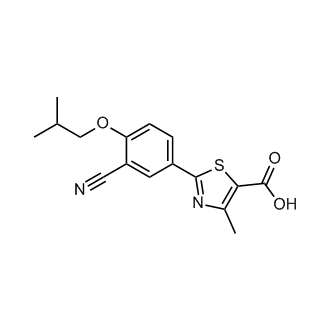| Size | Price | Stock |
|---|---|---|
| 5g | $18 | In-stock |
| 25g | $48 | In-stock |
| 100g | $152 | In-stock |
| 500g | $456 | In-stock |
| 1 kg | Get quote | |
| 2 kg | Get quote | |
| We match the lowest price on market. | ||
We offer a substantial discount on larger orders, please inquire via [email protected]
or Fax: (86)21-58955996
Inquiry for price and availability only. Please place your order via our email or fax.
| Cat. No. : | HY-14268 |
| M.Wt: | 316.37 |
| Formula: | C16H16N2O3S |
| Purity: | >98 % |
| Solubility: | DMSO : 50 mg/mL (ultrasonic) |
Febuxostat (TEI 6720) is a potent, selective and non-purine xanthine oxidase (XO) inhibitor with a Ki value of 0.6 nM. Febuxostat has the potential for the research of hyperuricemia and gout[1][2][3].
IC50 & Target:Ki: 0.6 nM (Xanthine oxidase)[1]
In Vitro: Febuxostat displays potent mixed-type inhibition of the activity of purified bovine milk xanthine oxidase, with Ki and Ki' values of 0.6 nM and 3.1 nM respectively, indicating inhibition of both the oxidized and reduced forms of xanthine oxidase[1].
In Vivo: Febuxostat (5-6 mg/kg; i.e.; daily for 4 weeks) (fed a high-fructose diet (60% fructose) for 8 wk) significantly reduces lomerular pressure, renal vasoconstriction, and afferent arteriolar area relative to fructose+P rats, and shows no significant effects in rats on a normal diet when febuxostat treatment alone[2].
Febuxostat (3-4 mg/kg; p.o.; daily for 4 weeks) with oxonic acid (750 mg/kg; oral gavage; daily for 4 weeks) preventes renal injury in 5/6 Nx (5/6 nephrectomy) rats with and without coexisting hyperuricemia[3].
Febuxostat (2.5 mg/kg; p.o.; daily for 12 weeks) inhibits plaque formation in ApoE?/? mice and reduces the levels of ROS in the aortic wall of atherosclerotic mice[4].
Febuxostat (15.6 mg/kg; p.o.; once daily for 21 successive days) shows antidepressant effect by significantly reduces the immobility time in the FST in mouse[5].
Febuxostat (10 mg/kg; p.o.; daily for 21 days) administration with doxorubicin caused a significant decrease in nephrotoxicity markers and inflammatory mediators, restoration of normal values of oxidative stress biomarkers and hampering the expression of renal caspase-3[6].
Lorem ipsum dolor sit amet, consectetur adipisicing elit. Autem earum hic iste maiores, nam neque rem suscipit. Adipisci consequatur error exercitationem fugit ipsam optio qui, quibusdam repellendus sed vero! Debitis.
Inquiry Information- Product Name:
- Febuxostat
- Cat. No.:
- HY-14268
- Quantity:


Your information is safe with us.